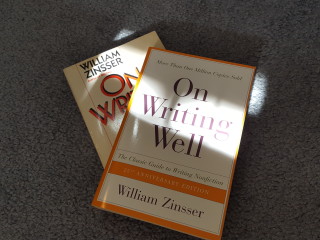
One of my favorite writing instructors turned me on to this book. I enjoyed reading it even more the third time, for reasons I will explain.
“Clarity, Simplicity, Brevity, Humanity” reads my handwritten note on the title page of William Zinsser’s On Writing Well. The rest of its pages are pinstriped with my underlinings from Larry Asher’s writing course where it was a textbook. This book is so good, I reread it when the course was over. That was in 2001.
Fifteen years later I was visiting my father, who is an author and retired English professor, to celebrate his 90th birthday. We were talking over drinks about writing and he said, “I have a book that you really should read.”
He went up to his library — which contained hundreds of books that I’m sure he thought I should read — and came down with his first edition of On Writing Well. Copyright 1976.
So I read this book for a third time on the plane on my way home, this time through my father’s eyes. He loves books and typically wouldn’t deface pages with my messy style of mark-up. (Instead, he would make faint underlines and margin notes in pencil.) But he made an exception here: His inky scribbles jump from the pages of On Writing Well.
I treasure my copy because it’s a timeless guide to good writing. I treasure my father’s copy because his emphatic underlinings are not the same as mine. I circled “Writing improves in direct ratio to the number of things we can keep out of it that shouldn’t be there.” Dad wrapped an entire paragraph in curly brackets. It begins:
“Clutter is the official language used by the American Corporation – in its news releases and its annual report – to hide its mistakes.”
(Little did either of us know I would find my calling in marketing!)
Both of those highlighted ideas are in the chapter titled “Clutter,” which could be called (but not titled) “Verbosity.” This chapter alone endeared me to Zinsser and his philosophies of writing. He urges writers to examine every sentence. He asks — as you’ll hear me ask if we work together — “Is every word doing new work?”
With many dozens of pieces of advice like that, you may feel Zinsser is burdening your writing process, but he’s actually making it easier and faster by making you a more efficient self-editor. No book can make writing easy. As William Zinsser says, “If you find that writing’s hard, it’s because it is hard.” But it doesn’t have to take very long.
Two writing teachers I admire have recommended this book to me, and I heartily recommend a prominent place for On Writing Well on your writer’s bookshelf. The 30th Anniversary Edition came out in paperback and Kindle. There’s also an audiobook.
This updated article was originally published on April 15, 2016.